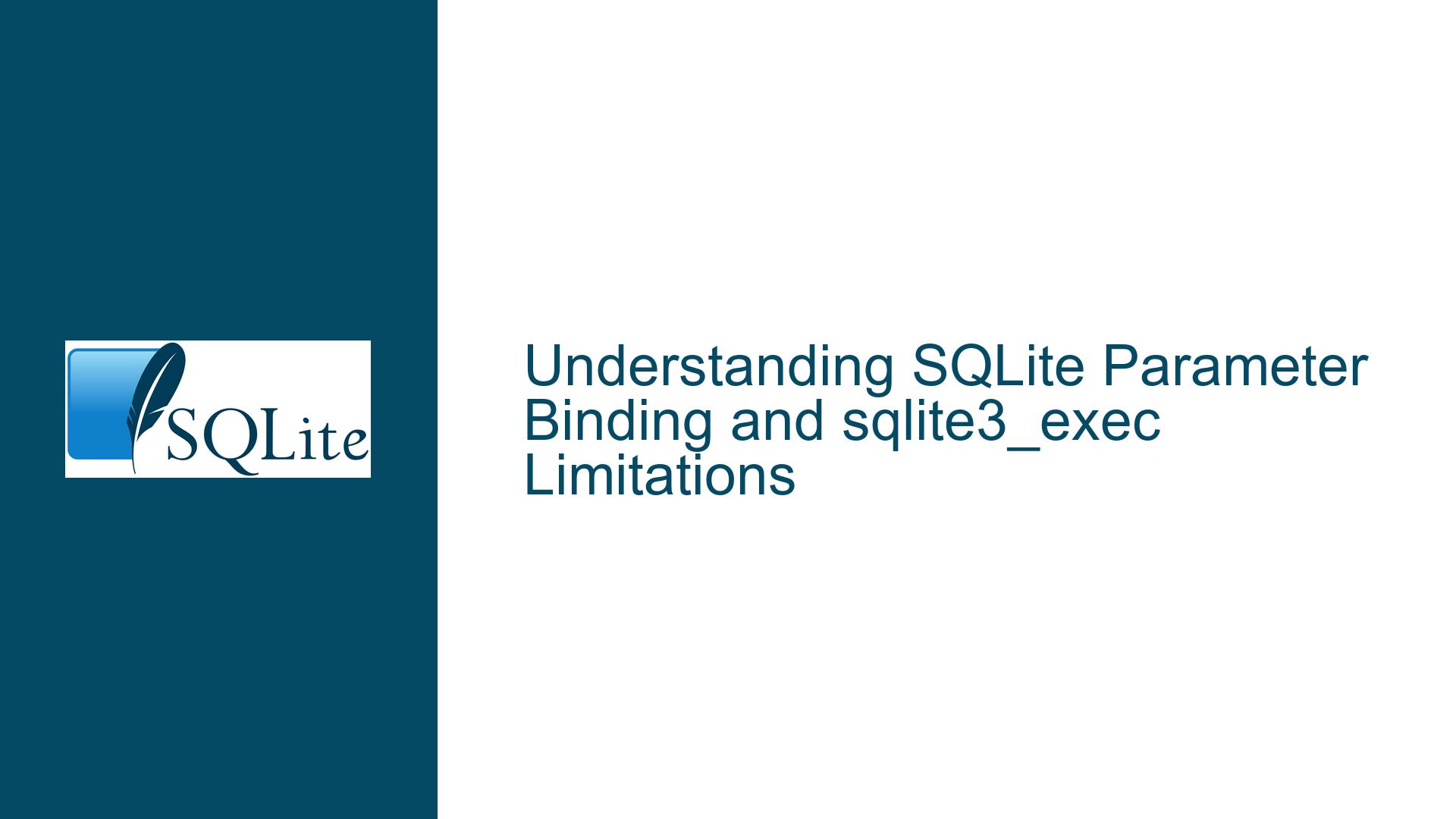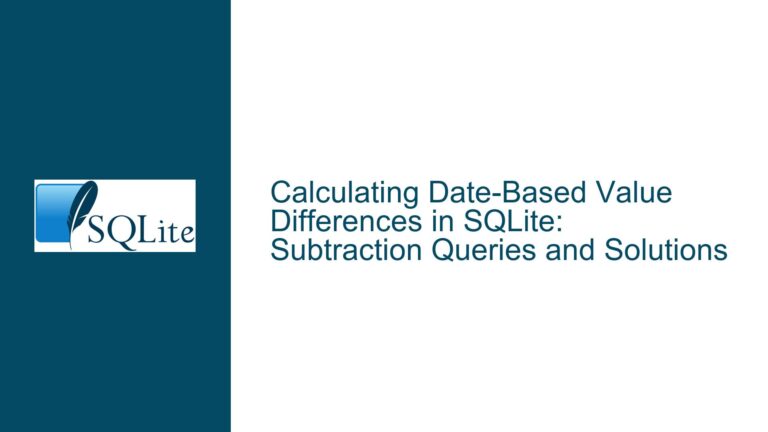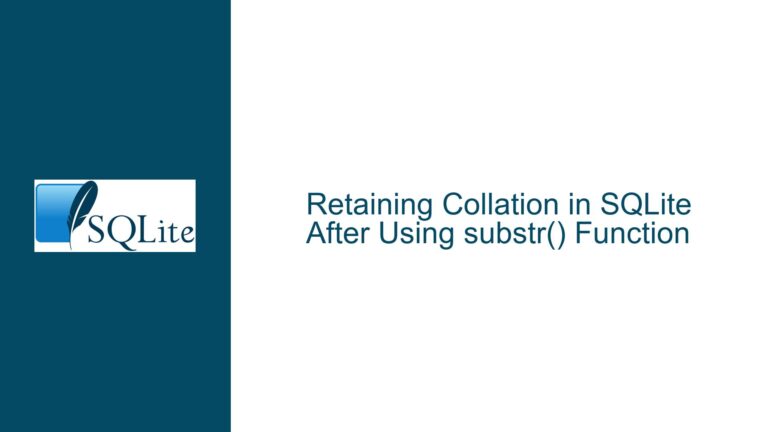SQLite Parameter Binding and sqlite3_exec Limitations
Core Misconceptions About Parameter Placeholders and sqlite3_exec
Parameter Binding Fundamentals in SQLite
SQLite’s parameter binding mechanism allows developers to separate SQL logic from data values, improving security, performance, and code maintainability. The ?1, ?2, etc., syntax represents ordinal parameter markers where ?1 binds to the first parameter value. This system prevents SQL injection attacks by ensuring user input never directly interpolates into SQL strings.
The confusion arises when combining parameter placeholders with the sqlite3_exec() API function. Unlike prepared statements created via sqlite3_prepare_v2(), sqlite3_exec() implicitly handles statement preparation, execution, and finalization in a single call. This convenience comes at a cost: sqlite3_exec() cannot bind parameters to placeholders, causing all unspecified parameters to default to NULL. When developers expect bound values but receive silent NULLs, queries return unexpected results without explicit error messages.
Three critical components interact here:
- SQL Syntax: The
?1placeholder is valid in any SQL statement - C API Layer:
sqlite3_exec()vs. prepared statement APIs - Binding Context: Whether parameters exist in a runtime environment where values can be attached
The root issue stems from assuming all SQLite APIs handle placeholders identically, when in reality parameter binding requires explicit interaction with the statement object through dedicated binding functions like sqlite3_bind_int() or sqlite3_bind_text().
Why Parameterized Queries Fail with sqlite3_exec
Architectural Constraints of sqlite3_exec
The sqlite3_exec() function operates as a convenience wrapper that combines four distinct operations:
sqlite3_prepare_v2() → sqlite3_step() → sqlite3_finalize() → Repeat for each SQL command
This abstraction hides the prepared statement lifecycle, making it impossible to bind parameters between preparation and execution. Since binding requires access to the intermediate sqlite3_stmt object (created by sqlite3_prepare_v2()), sqlite3_exec()‘s black-box nature prevents value injection.
When a SQL string containing ?1 passes to sqlite3_exec():
- The statement compiles without syntax errors (placeholders are legal)
- Execution proceeds with all unbound parameters set to NULL
- No error occurs because NULL is a valid binding state
- The WHERE clause effectively becomes
WHERE a=NULL, which behaves differently thanWHERE a=<unbound>due to SQL’s three-valued logic
This silent failure mode particularly affects developers transitioning from database engines that automatically bind parameters at the connection level or ORM layers that abstract these details.
Migrating from sqlite3_exec to Parameter-Aware Workflows
Step 1: Identifying sqlite3_exec Usage Patterns
Audit code for calls matching this pattern:
int rc = sqlite3_exec(
db,
"SELECT * FROM tab1 WHERE a=?1",
callback,
NULL,
&errmsg
);
Any SQL containing ? or :name placeholders in such calls indicates potential unbounded parameters.
Step 2: Converting to Prepared Statements
Replace sqlite3_exec() with explicit preparation/binding:
sqlite3_stmt *stmt;
const char *sql = "SELECT * FROM tab1 WHERE a=?1";
int rc = sqlite3_prepare_v2(db, sql, -1, &stmt, NULL);
if(rc == SQLITE_OK){
sqlite3_bind_int(stmt, 1, 42); // Bind 42 to parameter ?1
while(sqlite3_step(stmt) == SQLITE_ROW){
// Process row
}
sqlite3_finalize(stmt);
}
Key differences:
- Manual control over statement lifecycle
- Explicit binding before execution
- Row-by-row result processing
Step 3: Handling Multiple Statements
When sqlite3_exec() processes multiple SQL commands separated by semicolons, replace it with a loop that:
- Prepares each statement individually
- Binds parameters
- Steps through results
- Finalizes the statement
Use sqlite3_next_stmt() to iterate over nested statements if needed.
Advanced Binding Techniques
- Named Parameters: Use
:varor@varwithsqlite3_bind_parameter_index() - Type Enforcement: Leverage
sqlite3_bind_*type-specific functions - Transactional Control: Wrap batches of prepared statements in BEGIN/COMMIT
Debugging Unbound Parameters
Enable SQLite’s trace functionality to log final SQL:
sqlite3_trace_v2(db, SQLITE_TRACE_STMT,
[](unsigned mask, void*, void *pStmt, void*){
printf("Executing: %s\n", sqlite3_expanded_sql((sqlite3_stmt*)pStmt));
return 0;
}, NULL
);
This reveals whether parameters remain unbound (appear as NULL) in executed SQL.
Performance Considerations
While prepared statements require more code, they enable:
- Reuse: Reset and rebind statements for repeated execution
- Binary Transport: Avoid SQL parsing overhead on subsequent executions
- Memory Safety: Prevent memory leaks from string concatenation
For single-use queries, the performance difference is negligible, but parameter binding becomes crucial for security in all cases.






